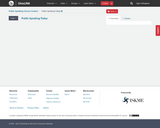
46 Results


There are many important reasons to study public speaking. This opening section explores public speaking in the modern age as well as the many benefits associated with becoming a competent speaker. This section also explains the process of public speaking and the different models of communication. Ethics is explored as well as the ethical choices public speakers and listeners must make. Last, this section introduces the National Communication Association’s Credo for Ethical Communication as well as the First Amendment to the U.S. Constitution in relation to free speech.
- Subject:
- Communication
- Public Relations
- Speaking and Listening
- Material Type:
- Module
- Date Added:
- 04/10/2019
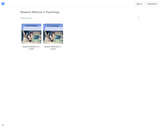
This textbook is an adaptation of the Research Methods in Psychology that is available on this site in US and Canadian editions. This New Zealand edition is an adaptation to the New Zealand context. The main changes are in Chapters 1 and 3 and the spelling, grammar, and terminology are changed throughout. This textbook is adopted at the University of Waikato in our 200-level research methods in psychology class.
- Subject:
- Psychology
- Social Science
- Material Type:
- Textbook
- Author:
- Paul C. Price
- Rajiv S. Jhangiani
- Date Added:
- 04/27/2020
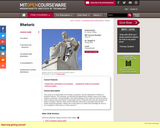
This course is an introduction to the theory, the practice, and the implications (both social and ethical) of rhetoric, the art and craft of persuasion. This semester, many of your skills will have the opportunity to be deepened by practice, including your analytical and critical thinking skills, your persuasive writing skills, and your oral presentation skills. In this course you will act as both a rhetor (a person who uses rhetoric) and as a rhetorical critic (one who studies the art of rhetoric). Both write to persuade; both ask and answer important questions. Always one of their goals is to create new knowledge for all of us, so no endeavor in this class is a "mere exercise."
- Subject:
- Composition and Rhetoric
- English Language Arts
- Material Type:
- Full Course
- Provider:
- M.I.T.
- Provider Set:
- M.I.T. OpenCourseWare
- Author:
- Steven
- Strang
- Date Added:
- 01/01/2015
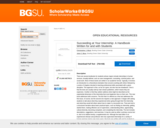
There are several textbooks for students whose majors include internships in human services, broadly defined, such as case management, counseling, criminal justice, and social work. Most of these books are written in an academic format. Typically, it involves an introduction to a theoretical orientation that concerns working with others followed by a series of chapters devoted to learning professional skills associated with a given discipline. This approach is fine, as far as it goes, but also has two drawbacks. One is that the texts are usually sold by main stream publishers, which means they are expensive. Another is that they seldom address what might be described as the experiential dimension of the internship that most beginners face on their own. This new book addresses both concerns. The fact that it is offered as a free text addresses the first issue, of course, but the second one requires a new approach. It began with asking students to talk about what they experienced when going through their first internship and what they would tell others about how to make it a successful one. That work led to a structured narrative about basic practical topics, such as finding an internship, getting started there, making effective use of supervision, understanding ethics, appreciating cultural diversity, becoming competent, and completing the internship. The text includes descriptions, suggestions, and exercises. It may be used as either a primary course text or, due to its relative brevity, a supplemental one. Although the lead editor is an experienced clinician and professor who has supervised internships for a variety of human services majors over many years, the book was written with and for students to make it more readable and more useful.
- Subject:
- Career and Technical Education
- Material Type:
- Textbook
- Provider:
- Bowling Green State University
- Author:
- Christopher J. Mruk
- John C. Moor
- Date Added:
- 11/03/2021
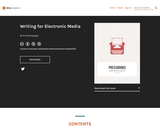
People’s viewing habits are changing as they migrate to mobile sources, social media, and kitten videos. Television News is still a dominant #1 source, and radio is still the safest way to stay informed in your car.
Hopefully, you already have some journalism background. This book does not teach the who, what, when, where, why, and how of reporting; its goal is to teach how to present the journalism you already know via electronic media, primarily television.
- Subject:
- Business and Communication
- Career and Technical Education
- Communication
- Electronic Technology
- Journalism
- Material Type:
- Textbook
- Provider:
- Rebus Community
- Author:
- Brian Champagne
- Brianna Bodily
- Kiera Farimond
- Date Added:
- 04/27/2020